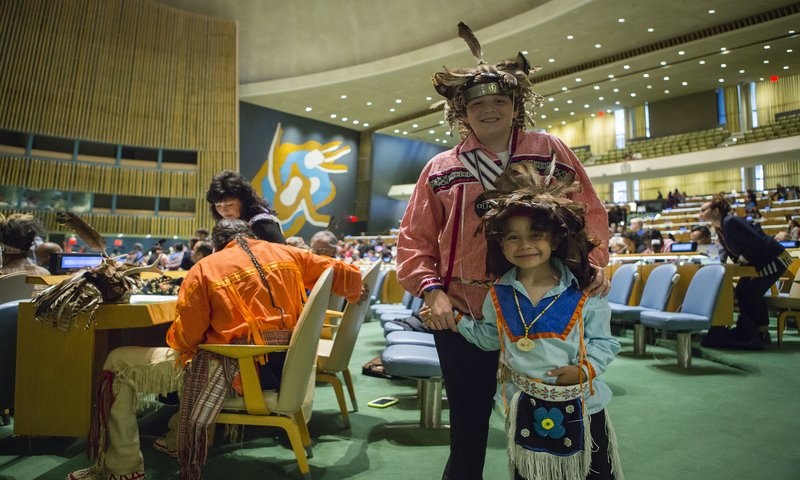
Indigenous youth are integral stakeholders of decision making processes at a local, national and global level. On the occasion of the United Nations Permanent Forum on Indigenous Issues (UNPFII), the UN Focal Point on Youth (UNDESA/DSPD) co-sponsored a side event with the Permanent Missions of Australia and Ecuador to discuss how to enhance indigenous youth development efforts and policies in the framework of the 2030 Agenda.
Last year’s UNPFII called on Member States, in collaboration with the United Nations Inter-Agency Network on Youth Development (IANYD), to increase the participation of indigenous youth at relevant meetings of the UN. This year’s UNPFII has been following-up on this recommendation. However, hindering the effective gathering of knowledge, understanding and analysis of the situation of indigenous youth in many countries is the lack of disaggregated data. The 2030 Agenda is in need of more statistical information as well as relevant indicators on indigenous youth. Not only will data on indigenous youth allow for evidence based policies, the process of data collection also presents indigenous youth with the opportunity to engage in the Sustainable Development Goals (SDGs).
UNDESA’s Division for Social Policy and Development has begun the process of data collection on indigenous youth and their work contains some alarming revelations. Indigenous youth are lagging behind on almost all social development indicators due to historical inequalities and power structures that keep indigenous peoples marginalized and excluded. For example, there are huge gaps in access to and completion of primary, secondary and higher education for indigenous youth, contributing to high illiteracy rates. Existing data also reveals that indigenous youth are struggling in areas of suicide, mental health and sexual health, and in some countries life expectancy is 10 years lower for indigenous youth compared to non-indigenous youth.
Gaining access to indigenous youth can be difficult. This event provided a platform for indigenous youth leaders from across the world to share their experiences on the issues of health, education and gender-based violence.
Mai Thin Yu Mon, representing the Indigenous Youth Caucus Asia, spoke to the challenges brought by restricted access to land, mainly that it is difficult for indigenous peoples to practice their traditional food systems and make use of traditional medicines, which adversely affects the health of indigenous communities. Ms. Mai Thin Yu Mon called on Member States to recognise indigenous traditional medicines and to certify those indigenous peoples who are experts in this area as practitioners so that indigenous communities can rely own their own peoples.
Q"apaj Conde, who is a young indigenous lawyer from Bolivia, spoke about the challenges indigenous young people face in accessing education that is culturally relevant and in their mother tongue languages. Very often indigenous youth have to make difficult choices between obtaining a formal education in the cities or staying connected to their communities, lands and territories.
Sarah Lynn Jancke, representing the Indigenous Youth Caucus Arctic, reminded us that gender based violence often happens in silence and is caused by societal barriers and colonisation culture, in which indigenous women have become outlets for disrespect and rage. However, some indigenous men and youth are taking a stand against gender based violence.
In Ecuador, there is also evidence of indigenous youth actively participating in social change and transformation processes. A representative from the Ecuadorian government recalled their constitution which enshrines the rights of young females and males and safeguards their effective and long-term participation in all spheres including education, health, housing, recreation, sport, free time and freedom of expression and association. The Ecuadorian government has also lowered the voting age to 16 and reduced gaps in education access. For example, 13,083 self-identified indigenous peoples currently have university degrees in Ecuador and between 2014 and 2016 3,500 indigenous peoples received scholarships to attend international universities.
The event also heard opening remarks from Ms. Tarcila Rivera Zea, who is an expert member of the UN Permanent Forum on Indigenous Issues. She congratulated the indigenous youths on their strong engagement at the meeting of the UN Permanent Forum and called for them to organize as a global movement to take the rights of indigenous peoples, including indigenous youth, forward.
Yon Fernandez-de-Larrinoa, Indigenous Peoples Team Leader of the Food and Agricultural Organisation (FAO) stated that the 2030 Agenda will not be achieved unless indigenous youth are involved. He emphasised that youth are the future, but that indigenous youth are a specific future; they are connectors between tradition and future, and mother earth and achieving Agenda 2030. The FAO have agreed to host an Indigenous Forum on Youth, providing more opportunities for youth participation and to disseminate information, and invited all indigenous youth to work with them and UNDESA/DSPD to ensure that indigenous youth are not left behind.
The UN Focal Point on Youth is committed to working more closely with indigenous youth and ensuring that they are responsible actors in achieving the 2030 Agenda. If you work in the field of indigenous youth and are interested in data collection, please email youth@un.org.
To learn more about DSPD's work on youth click here.
Source: UNDESA DSPD
 Welcome to the United Nations
Welcome to the United Nations